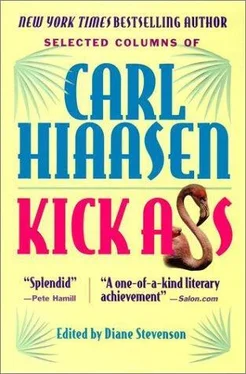Here's one idea you won't hear from government planners: Don't build any more shopping malls until the ones we've got are at least 90 percent occupied—and the stores are actually making a profit.
There's a radical notion. No one suggests such a thing because it means saying no to fat-cat developers and their lawyers. Saying no to a mall is like saying no to growth, and saying no to growth is like spitting on the flag.
Why, what would we do without another multiplex cinema—a dozen theaters, each no bigger than a tollbooth! Where else but a mall could we buy our apricot bagels? Where else could our daughters get their ears pierced?
And, most of all, what would we do with all that open space if there were no more shopping malls? Oh, I suppose you could plant some trees, put in a playground or maybe a ballpark for the kids.
But what neighborhood would ever go for something so dull when it could have its very own J. C. Penney and Wicker World and Orange Julius and parking lots as far as the eye can see.
We're talking quality of life.
A message to outsiders: Florida's full
January 5, 1990
The latest census figures show that the 1980s was a decade of astounding migration to the South and the West. Florida continues to draw new residents like a dead marlin draws flies. Between the 1980 census and July 1, 1989, the state's population grew from 9.7 million people to an estimated 12.7 million people—an increase of 31 percent.
Anyone who says this is good news needs to have his head examined. It's a disaster in the making, an avalanche of humanity with which our state has no prayer of coping. As it is, we don't have enough roads, schools, police, water, affordable housing or health care. We apparently don't even have enough electricity to operate our toasters during a cold snap.
Yet still they come to Florida, in hopeful hordes, at a rate of about 900 a day. What accounts for this lemming-like behavior? More to the point, what accounts for our welcoming them so cheerily?
To hear some civic boosters talk, we should all be proud that so many folks are dying to be our new neighbors. It's as if we've all pitched in to make this a little slice of paradise, with lots to offer.
Hogwash. We had nothing to do with it. People move to Florida for the same reasons they've always moved to Florida: to get warm and stay warm. No matter how crowded or crime-ridden this state becomes, it'll always look better than a dying factory town on the shore of Lake Erie in the dead of winter.
Florida is where folks come when things get unbearable back home. It's been that way ever since they invented air-conditioning and bug spray.
Only three states grew faster in the 1980s: Arizona, Alaska and Nevada. None is in any immediate danger of becoming urbanized; Arizona's entire population is no more than that of Dade, Broward and Monroe counties together.
It's more reasonable to compare what's happening in Florida with the trend in other populous states. In the 19805 we absorbed more new residents than New York, Pennsylvania, Illinois, Ohio or Texas. Only California (which has considerably more space) took in more people than we did.
Every year Florida's population grows by about 320,000—that's an entire city larger than Tampa. Every single year.
This must stop if the place is to be saved. Stanching the flood will require higher taxes, tougher laws and a few courageous politicians who aren't afraid to say enough is enough. Try to find just one.
Not that the cataclysm has been ignored. The 1980s was the decade in which state legislators embraced the term "growth management" and passed important laws to try to improve local planning. Not a week goes by that some university scholars or blue-ribbon panel aren't conducting a symposium on growth and all its implications—social, economic and environmental.
Some of the brightest people in Florida are hot on the case. The problem is, the faucet is still running.
And too many people are getting rich off the migration to admit that it's a peril. The money that fuels political campaigns tends to come from people who prosper from rampant growth and development. They cannot conceive of a place where these things would be controlled or, God forbid, halted.
Ironically, many who are suggesting such remedies were once migrants themselves. They see Florida becoming a place very much like the one they fled, and they'd like to prevent that from happening.
So now you want to slam the door? reply the guys in the suits; now that you've got your piece of paradise, you want to lock out the others, is that it?
Exactly. Because the alternative is to be overrun, choked and bankrupted; to destroy the very natural beauty that attracted all these people in the first place; to let the hordes keep coming until there's nowhere to put them—and then let our children and grandchildren worry about what to do next.
Damn right we should slam the door, or at least put a shoulder to it.
Gas-tax veto wisely brakes development
May 9, 1990
Lots of people are lambasting Gov. Martinez for vetoing the proposed four-cent gasoline tax, which would have provided several hundred million dollars for road projects.
The critics say the governor's veto was irresponsible. They say it will hurt the economy by obstructing "growth management."
Translation: Without new roads, it's harder for developers to get new projects approved. It's no mystery why the most vocal supporters of the gas tax were road contractors, builders and chambers of commerce.
Maybe the governor didn't believe Floridians wanted the tax, or maybe he truly felt the money would be spent "unwisely and inappropriately." Either way, the veto was the right thing to do.
In what dream world do the gas-tax proponents dwell? It must be a fairy-tale place, where all construction contracts are awarded wisely, where the work is completed within budget, without scandal and always on time.
Where is this magical land? It's not Florida, that's for sure.
The Department of Transportation has suffered through some inglorious budget screwups. In 1988, $700 million in projects had to be canceled or scaled down. Last year the department came up $116 million short for purchasing rights-of-way. The Martinez administration deserves blame for chaotic mismanagement, but at least the governor this year had the sense not to give DOT more money to lose.
It's bad enough that most projects cost millions over budget, and drag months and even years past deadline. The worst part is: By the time these roads get finished, they are already obsolete.
For example, we've been dourly forewarned that the interminable widening of I-95 will be hopelessly inadequate, and that shortly after the highway's completion motorists will again find themselves mired in truck traffic. Wonderful.
Sure, many roads already are perilously congested. And yes, some of the bridges are falling down. Is more money the answer? Not if it goes for highway projects designed to fuel more growth—because growth is the root of the problem.
Florida has too many people in too many cars, and the numbers swell by nearly 900 a day. Until we do something drastic to reverse this trend, there's no hope of having a modern, efficient road system. Government is incapable of keeping pace with such an insane migration.
Some of the projects in the doomed transportation bill undoubtedly would have improved transit, cut down on auto pollution and saved lives. Few would argue the need to widen bloody U.S. 27 in Palm Beach County.
However, prudent taxpayers might question other big-ticket items that would have received funds from the gas tax. For example, would the city of Fort Lauderdale really grind to a halt if A1A were not rebuilt to accommodate commercial development along the beach? This seems an odd priority, considering the plight of less glamorous neighborhoods where people can't even get a simple pothole patched.
Читать дальше









